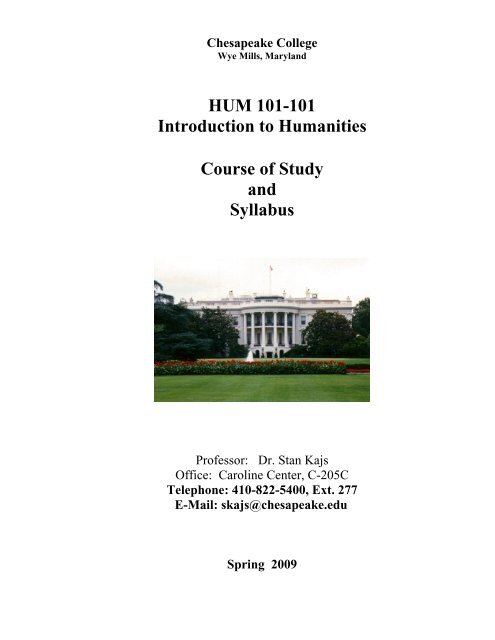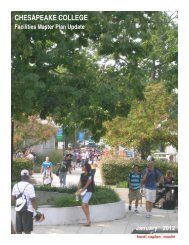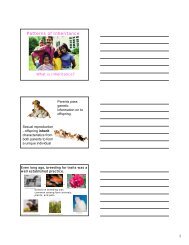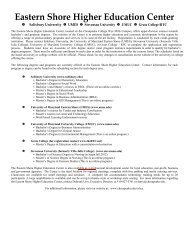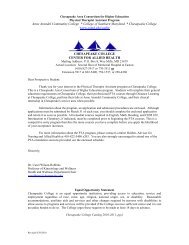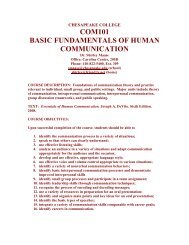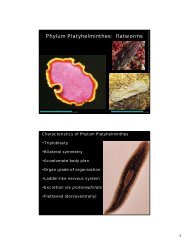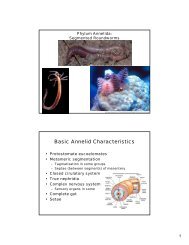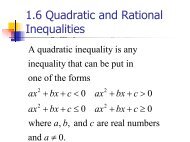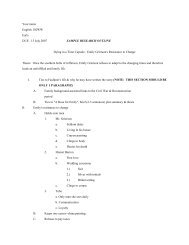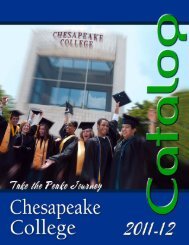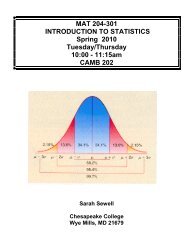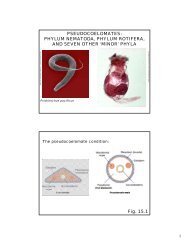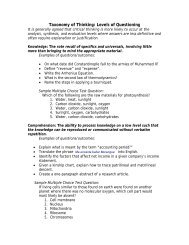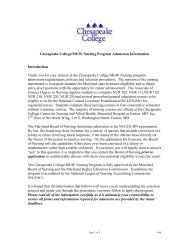HUM 101-101 Introduction to Humanities Course of Study and
HUM 101-101 Introduction to Humanities Course of Study and
HUM 101-101 Introduction to Humanities Course of Study and
Create successful ePaper yourself
Turn your PDF publications into a flip-book with our unique Google optimized e-Paper software.
Chesapeake College<br />
Wye Mills, Maryl<strong>and</strong><br />
<strong>HUM</strong> <strong>101</strong>-<strong>101</strong><br />
<strong>Introduction</strong> <strong>to</strong> <strong>Humanities</strong><br />
<strong>Course</strong> <strong>of</strong> <strong>Study</strong><br />
<strong>and</strong><br />
Syllabus<br />
Pr<strong>of</strong>essor: Dr. Stan Kajs<br />
Office: Caroline Center, C-205C<br />
Telephone: 410-822-5400, Ext. 277<br />
E-Mail: skajs@chesapeake.edu<br />
Spring 2009
<strong>HUM</strong> <strong>101</strong>-<strong>101</strong> <strong>Introduction</strong> <strong>to</strong> <strong>Humanities</strong><br />
<strong>Course</strong> <strong>of</strong> <strong>Study</strong><br />
Spring 2009<br />
Monday & Wednesday<br />
11:30 a.m.-12:45 p.m.<br />
Pr<strong>of</strong>essor Dr. Stan Kajs<br />
Description<br />
Office: Caroline Center, C-205C<br />
Telephone: 410-822-5400, Ext. 277<br />
E-Mail: skajs@chesapeake.edu<br />
An introduction <strong>to</strong> the role <strong>of</strong> art, architecture, music, <strong>and</strong> drama in the human experience from the<br />
Greek World <strong>to</strong> the Present. Attention is given <strong>to</strong> the culture <strong>of</strong> the Orient <strong>and</strong> the Americas as well as<br />
the development <strong>of</strong> Western Civilization.<br />
Competencies<br />
This course is designed <strong>to</strong> present recognized academic content <strong>and</strong> <strong>to</strong> provide the student with the<br />
opportunity <strong>to</strong> improve skills <strong>and</strong> enhance knowledge <strong>to</strong><br />
<br />
<br />
<br />
<br />
<br />
<br />
<br />
<br />
<br />
Communicate in oral <strong>and</strong> written English.<br />
Read with comprehension.<br />
Demonstrate information literacy.<br />
Think critically <strong>and</strong> reason abstractly.<br />
Appreciate the nature <strong>and</strong> value <strong>of</strong> the fine <strong>and</strong> performing arts.<br />
Apply technology <strong>to</strong> learning.<br />
Apply knowledge <strong>and</strong> skills <strong>to</strong> foster ethical behavior <strong>and</strong> civic engagement.<br />
Appreciate cultural diversity.<br />
Enhance lifelong learning.<br />
Learning Outcomes<br />
By the end <strong>of</strong> the course, the student should be able <strong>to</strong><br />
<br />
<br />
<br />
<br />
<br />
<br />
<br />
<br />
Define <strong>and</strong> analyze the myth <strong>of</strong> each civilization under study.<br />
Analysis ways a current myth promotes itself <strong>and</strong> degrades its opposition.<br />
Identify the cultural contributions <strong>of</strong> each civilization.<br />
Explain each civilization in terms <strong>of</strong> the following features:<br />
science, technology, religion, philosophy, societal values, <strong>and</strong> artistic expression.<br />
Identify the influences <strong>of</strong> civilizations on one another in terms <strong>of</strong> the humanities.<br />
Identify paintings, sculpture, architecture, literature, <strong>and</strong> music <strong>of</strong> the course in terms <strong>of</strong> myth.<br />
Analyze, compare, <strong>and</strong> contrast select works <strong>of</strong> art, architecture, music, <strong>and</strong> literature in terms <strong>of</strong><br />
style, theme, imagery, form, <strong>and</strong> composition.<br />
Write a report about a work studied on an approved arts field trip.<br />
<strong>HUM</strong> <strong>101</strong> <strong>Introduction</strong> <strong>to</strong> <strong>Humanities</strong><br />
<strong>HUM</strong> <strong>101</strong> COS & Syllabus 2<br />
Spring 2009
“It is the mark <strong>of</strong> an educated mind <strong>to</strong> be able <strong>to</strong> entertain<br />
a thought without accepting it.”—Aris<strong>to</strong>tle<br />
<strong>Course</strong> <strong>of</strong> <strong>Study</strong><br />
Definition <strong>of</strong> a Student: one who is eager, takes great pain, <strong>and</strong> is earnest <strong>to</strong> learn. A true student<br />
attends all class sessions, reads the textbook, takes notes, participates in class discussions, answers<br />
questions in the <strong>Study</strong> Guide, completes homework assignments, <strong>and</strong> takes all tests as scheduled.<br />
He/she does not hold the consumer attitude that focuses on receiving the highest possible grade for the<br />
least amount <strong>of</strong> effort.<br />
Classroom Policies<br />
1. Because attendance is important for student success, students are expected <strong>to</strong> attend all classes, that<br />
is, <strong>to</strong> arrive for class sessions on time <strong>and</strong> <strong>to</strong> remain the entire period. Those who arrive after their<br />
names are called or leave before the pr<strong>of</strong>essor dismisses class will be marked absent. Tardy students<br />
with should meet with the pr<strong>of</strong>essor after class.<br />
2. Students are expected <strong>to</strong> show respect for the pr<strong>of</strong>essor <strong>and</strong> fellow students, for example, by not<br />
packing up their bags <strong>to</strong> leave before the pr<strong>of</strong>essor dismisses class.<br />
3. Students are expected <strong>to</strong> respect each other by acting courteously, for example by listening<br />
attentively when another person is speaking. Chatting in class (private conversations) will not be<br />
<strong>to</strong>lerated.<br />
4. Student may not chew gum during class or wear headgear (caps, hats) while in the classroom.<br />
5. Students must keep their electronic devices on “<strong>of</strong>f” <strong>and</strong> s<strong>to</strong>wed in their backpacks or bags away<br />
from the desk<strong>to</strong>p. Students using electronic devices in class may be asked <strong>to</strong> leave the room.<br />
6. Students are expected <strong>to</strong> participate in class discussions <strong>and</strong> activities. A participation grade will<br />
reflect the amount, quality, <strong>and</strong> relevance <strong>of</strong> their constructive involvement in these activities.<br />
7. A student’s disregard <strong>of</strong> these policies will affect his or her participation grade.<br />
7. Disruptive or uncooperative students will be <strong>to</strong>ld <strong>to</strong> leave the classroom. Repeat <strong>of</strong>fenders will be<br />
dismissed from the course.<br />
8. Use proper etiquette in communicating via email with your pr<strong>of</strong>essor if you want him <strong>to</strong> reply.<br />
9. A student’s response <strong>to</strong> these classroom policies will be reflected in his or her participation grade.<br />
Text<br />
Bishop, Philip E. Adventures in the Human Spirit. 5th Edition.<br />
Englewood Cliffs, N. J.: Prentice-Hall, Inc., 2004.<br />
<strong>HUM</strong> <strong>101</strong> <strong>Introduction</strong> <strong>to</strong> <strong>Humanities</strong>, <strong>Study</strong> Guide Questions<br />
Nota Bene: The Student is responsible for knowing all the material in the text, even that not presented<br />
or discussed in class sessions.<br />
<strong>HUM</strong> <strong>101</strong> <strong>Introduction</strong> <strong>to</strong> <strong>Humanities</strong><br />
<strong>HUM</strong> <strong>101</strong> COS & Syllabus 3<br />
Spring 2009
Assignments<br />
“There are more things in heaven <strong>and</strong> earth, Horatio, than are dreamt <strong>of</strong> in your philosophy.”<br />
-- Shakespeare’s Hamlet<br />
<strong>Course</strong> <strong>of</strong> <strong>Study</strong><br />
Field Trip: Write a report on a field trip <strong>to</strong> the National Gallery in Washing<strong>to</strong>n, D. C. or Option B.<br />
Due Date: April 20, 2009. See h<strong>and</strong>out.<br />
Class Participation: Ask <strong>and</strong> answer questions <strong>and</strong> discuss course materials in class.<br />
Two Tests: Take two objective <strong>and</strong> essay tests after major units <strong>of</strong> material. Should you have an<br />
acceptable reason for missing the classroom test, you may make-up the test in the Testing Center<br />
before the next scheduled test. Check with your pr<strong>of</strong>essor for approval.<br />
Final Examination: Present your knowledge <strong>of</strong> the course material by answering objective<br />
questions <strong>and</strong> writing essays in this caps<strong>to</strong>ne evaluation. No make-up exam is permitted.<br />
Evaluation<br />
Assignments<br />
Percentage<br />
Field Trip 25%<br />
Class Participation 15%<br />
Test 1 15%<br />
Test 2 15%<br />
Final Examination 30%<br />
100%<br />
Final grades will be determined according <strong>to</strong> the schedule in the College catalog.<br />
<strong>HUM</strong> <strong>101</strong> <strong>Introduction</strong> <strong>to</strong> <strong>Humanities</strong><br />
<strong>HUM</strong> <strong>101</strong> COS & Syllabus 4<br />
Spring 2009
“An unexamined life is not worth living.”—Socrates<br />
Syllabus<br />
January 21<br />
January 26<br />
January 28<br />
February 2<br />
February 4<br />
February 9<br />
February 11<br />
February 16<br />
February 18<br />
Explanation <strong>of</strong> the <strong>Course</strong> <strong>of</strong> <strong>Study</strong> <strong>and</strong> Syllabus<br />
Read Chapter 1: The <strong>Humanities</strong>: An <strong>Introduction</strong> <strong>to</strong> the Adventure.<br />
Lecture <strong>and</strong> Discussion: Background <strong>and</strong> <strong>Introduction</strong> <strong>to</strong> the <strong>Course</strong><br />
Continue Background <strong>of</strong> <strong>Course</strong> Material.<br />
Continue Background <strong>of</strong> <strong>Course</strong> Material<br />
Film <strong>and</strong> Discussion: The Odyssey (The Myth <strong>of</strong> Olympus).<br />
Read Chapter 2: The Ancient World <strong>and</strong><br />
Chapter 3: Ancient Greece: The Classical Spirit (The Classical Greek Myth).<br />
Continue Chapter 3: Ancient Greece: The Classical Spirit (The Classical Greek<br />
Myth).<br />
Read Chapter 4: Ancient Rome: The Spirit <strong>of</strong> Empire (The Roman Myth <strong>of</strong> Empire)<br />
Continue Chapter 4: Ancient Rome: The Spirit <strong>of</strong> Empire (The Roman Myth <strong>of</strong><br />
Empire).<br />
February 23 Take Test #1: Chapters 2-4.<br />
February 25<br />
March 2<br />
March 4<br />
March 9<br />
March 11<br />
March 16-20<br />
Read Chapter 5: The Judeo-Christian Spirit<br />
Presentation <strong>of</strong> Major World Religions: Myth <strong>of</strong> Judaism<br />
Presentation <strong>of</strong> Major World Religions: Myth <strong>of</strong> Buddhism<br />
Continue Myth <strong>of</strong> Buddhism.<br />
View Film Islam Art <strong>and</strong> discuss (The Myth <strong>of</strong> Islam).<br />
Read Chapter 6: The Early Middle Ages: The Feudal Spirit. (Myth <strong>of</strong><br />
Christianity). In-class Project: Dante’s Divine Comedy on the Internet<br />
Spring Break: No Classes<br />
<strong>HUM</strong> <strong>101</strong> <strong>Introduction</strong> <strong>to</strong> <strong>Humanities</strong><br />
<strong>HUM</strong> <strong>101</strong> COS & Syllabus 5<br />
Spring 2009
“Life isn’t about finding yourself. Life is about creating yourself.”—George Bernard Shaw<br />
March 23<br />
March 25<br />
March 30<br />
April 1<br />
April 6<br />
April 8<br />
Continue Myth <strong>of</strong> Christianity.<br />
Read Chapter 7: The Late Middle Ages: The Gothic Awakening.<br />
Read Chapter 8: The Renaissance Spirit in Italy.<br />
Read Chapter 9: The Northern <strong>and</strong> Late Renaissance.<br />
View <strong>and</strong> discuss the film, Joshua.<br />
Continue viewing <strong>and</strong> discussing the film Joshua.<br />
Read Chapter 10: The Spirit <strong>of</strong> Baroque.<br />
Discuss Joshua.<br />
Presentation <strong>of</strong> the Myth <strong>of</strong> Monarchy<br />
April 13 Take Test #2: Chapters 5-10.<br />
April 15<br />
April 20<br />
April 22<br />
April 27<br />
April 29<br />
May 4<br />
Read Chapter 11: The Spirit <strong>of</strong> Enlightenment (The Myth <strong>of</strong> Republic).<br />
Presentation on Ben Franklin as Transitional Figure<br />
Read Chapter 12: Revolution <strong>and</strong> Romanticism (The Myth <strong>of</strong> Self).<br />
Discuss Caps<strong>to</strong>ne Assignment.<br />
Field Trip Assignment Due<br />
Read Chapter 13: The Industrial Age: The Spirit <strong>of</strong> Materialism<br />
(The Myth <strong>of</strong> Science <strong>and</strong> Technology).<br />
View the film, What the Bleep Do We Know?<br />
Continue What the Bleep Do We Know?<br />
Discuss What the Bleep Do We Know?<br />
Read Chapter 14: The Spirit <strong>of</strong> Modernism.<br />
Read Chapter 15: The Contemporary Spirit.<br />
(The Myth <strong>of</strong> Capitalism)<br />
May 6<br />
Musical Journey: In-class Extra Credit Assignment<br />
11:00am-1:00pm Final Exam, Chapters 2-15<br />
<strong>HUM</strong> <strong>101</strong> COS & Syllabus 6<br />
Spring 2009


